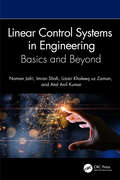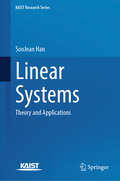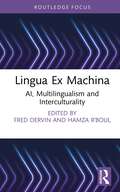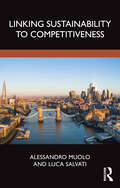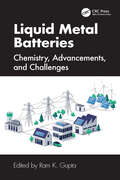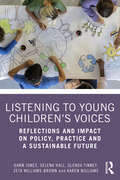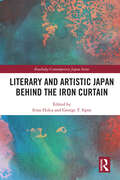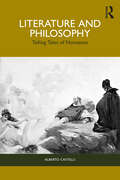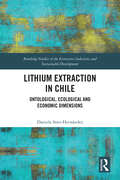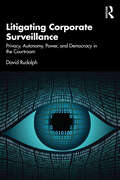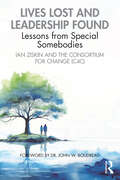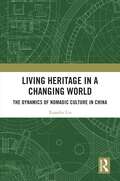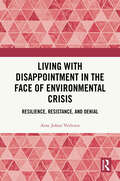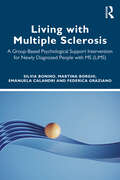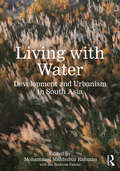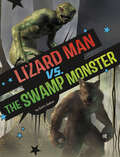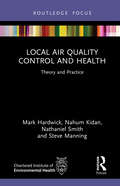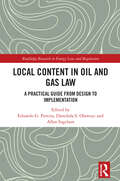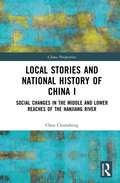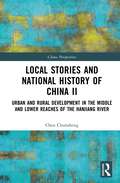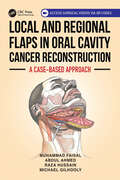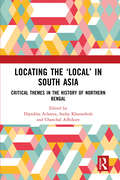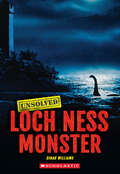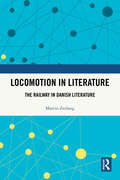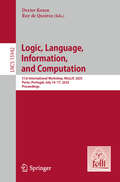- Table View
- List View
Linear Control Systems in Engineering: Basics and Beyond
by Atal Anil Kumar Uzair Khaleeq Zaman Noman Jafri Imran ShafiThis textbook examines classical and modern control strategies toward systems’ best performance, especially concerning design and operations. It simplifies control theory concepts through related mathematics and examples of real-life systems worldwide.Linear Control Systems in Engineering: Basics and Beyond covers the fundamental principles of control systems and advanced topics providing a comprehensive resource for readers at different levels of ability. It is written in an infographic language as much as possible, making complex concepts in control systems accessible to a broad audience, including students and professionals. The textbook includes many examples and practical exercises to reinforce learning and demonstrate how control systems work in various engineering domains. The textbook focuses on both the conventional and contemporary control systems technologies and trends, such as digital control, automation, and robust control. It also highlights analysis, stability, and optimization techniques for control systems in a sole source.The textbook is written for both undergraduate and graduate courses dealing with the subjects of electrical, mechanical, mechatronics, chemical, and aerospace engineering. It will take the reader from basic concepts and applications to advanced topics, and the book will be the sole source to reach knowledge and explore future possibilities related to control design techniques, methodologies, and operations from basic to beyond.A solutions manual and PowerPoint slides are available for qualified textbook adoption.
Linear Systems: Theory and Applications (KAIST Research Series)
by SooJean HanThis book is about Linear Systems Theory, one of the most fundamental and important prerequisites necessary to study modern control techniques. Primarily intended for first-year graduate students (and advanced undergraduates) who are interested in the field of control, this book provides both a complete coverage of all standard linear systems concepts. More importantly, it extends these concepts through a smooth transition to the next level of control theory subfields, including nonlinear control, robust control, adaptive control, and stochastic control. The book achieves this by setting itself apart from many existing linear systems texts in two main ways. First, while many older texts remain influential, their ages also mean less connection to modern real-world applications, especially in rapidly evolving areas like data-driven control and autonomous control. Second, this book emphasizes the mathematical rigor foundational to control theory, offering a more complete understanding than texts that prioritize accessibility over depth. As readers will inevitably encounter such rigor and mathematical thinking while progressing through more advanced education, even in fields outside of controls, an earlier introduction to it is more favorable. This book is organized into four main parts: 1) linear system properties, 2) linear stability, 3) linear control and estimation, and 4) linear optimal control and estimation. The main chapters of this book are focused on presenting the essential ideas and tools needed to understand and apply linear systems, while reviewing all relevant preliminaries in a self-contained manner.
Lingua Ex Machina: AI, Multilingualism and Interculturality (New Perspectives on Teaching Interculturality)
by Fred Dervin Hamza R’boulLingua Ex Machina: AI, Multilingualism and Interculturality explores the evolving role of AI in shaping language, communication and intercultural encounters.The term ‘Lingua Ex Machina’ (literally ‘language from the machine’) encapsulates the paradox of AI acting as both a tool for bridging linguistic and intercultural divides, and a potential amplifier of inequalities. This edited volume brings together critical perspectives on the impact of AI on language diversity, translation, education and the production and dissemination of knowledge. From questioning whether AI is more than a sophisticated ‘parrot’ to examining its effects on minor languages and intercultural education communication and research, the contributors highlight both the promises and drawbacks of machine-mediated communication. They also urge readers to reflect on the future of language, advocating for a reflexive approach to technology that prioritises agency, diversity, and critical engagement.This interdisciplinary book is an essential read for students, scholars, and practitioners interested in multilingualism, intercultural communication education, and the implications of AI.
Linking Sustainability to Competitiveness
by Luca Salvati Alessandro MuoloThis book identifies and discusses opportunities and constraints in applying the sustainability paradigm to urbanization. It integrates this wide concept with ‘local competitiveness’ and focuses on the role of both general and specific political action in shaping the economic structure of a region.By linking sustainability and local competitiveness within metropolitan regions, it offers an innovative exploration of urbanization processes. Moving beyond the usual institutional and regional economic approaches, the book integrates perspectives from economic geography, sociology, demography, ecology, and planning. It presents practical tools and real-world data, enabling readers to interpret and delve into new urban development paths. By exploring the interaction between urban sustainability and economic competitiveness, a framework is provided that supports informed policymaking decisions at local, regional, and national scales.This book is written for academics and students—from undergraduates to doctoral candidates—who want a clear, practical look at how local economies, sustainability, and competitiveness come together. It is also helpful for professionals, policymakers, and for anyone curious about how economic growth might become a long-term sustainable political goal.
Liquid Metal Batteries: Chemistry, Advancements, and Challenges
by Ram K. GuptaThis book offers a broad overview of the current knowledge and future challenges in liquid metal batteries. It details the fundamental science of liquid metal batteries, materials for cathode and anode, various synthesis methods, and approaches to modify their properties to provide high energy and power densities, along with long life. It offers a broad overview of current research and future challenges in this exciting field. • Covers materials, chemistry, and technologies for liquid metal batteries.• Discusses the state of the art and challenges.• Explains the fundamentals of electrochemical behavior of liquid metal batteries.• Offers insight into design and architectural aspects.• Provides new direction to scientists, researchers, and students to better understand the chemistry, electrochemical properties, and technologies of liquid metal batteries.With chapters written by experts in energy from around the globe, this book serves as a textbook for advanced students and offers new guidelines to researchers and industries working in energy and materials engineering.
Listening to Young Children’s Voices: Reflections and Impact on Policy, Practice and a Sustainable Future
by Karen Williams Zeta Williams-Brown Dawn Jones Selena Hall Glenda TinneyBy putting children’s voices at the heart of early childhood education, this essential textbook will help students truly understand what it is young children are saying and will show them how to support the promotion of the child’s voice.Through an innovative story-like approach led by the perspective of children themselves, the authors encourage readers to critically consider how careful listening and responding to young children’s ideas and opinions provides exciting opportunities for a new pedagogical approach within education, thereby challenging dominant discourses. By focusing on real-life examples of what children say about things that are important to them, Listening to Young Children’s Voices provides a wealth of ideas and practical exercises to support an understanding of effective listening. Drawing from research and professional experience, and using theory and new conceptual ideas, the authors guide students to develop knowledge and critical thinking skills.This book makes an important contribution to the discipline of early childhood education. It will be an invaluable tool for those working with and alongside young children, students, educationalists, and policy makers.
Literary and Artistic Japan behind the Iron Curtain (Routledge Contemporary Japan Series)
by George T. Sipos Irina HolcaThis book examines the public perception, scholarly reception, and critical analysis of Japan through translations of its literature and artistic endeavors within the temporal frame and geopolitical confines of the countries that were either occupied or left under the influence of the Soviet Union after World War II.By engaging with literary translations from Japanese into languages such as Romanian, Russian, Czech, Hungarian, German, and Slovenian, alongside art exhibits and performance shows focused on Japan, this book provides an original contribution to the field of Japanese studies in Eastern and Central Europe and the former Soviet space. In addition, by offering a multifaceted, multilingual, and multicultural approach to the diverse realities of countries from the former communist bloc, the book sheds light on the unique relationships they created with literary and artistic Japan, as well as the unique ways in which they attempted to lift the Iron Curtain and gaze at the Asian Other, a subject of both fascination and identification.Approaching the subject of Japanese culture through the unique lens of former communist bloc nations, this book will appeal to students and scholars of Japanese studies and Japanese literature, particularly in the context of translations.
Literature and Philosophy: Telling Tales of Nonsense
by Alberto CastelliThis book examines the relationship between literature and philosophy. It investigates seemingly incomprehensible behaviors from the perspective of philosophy and expounds on love by using, among others, Darwinism, Marxism, Existentialism, Plato, Kierkegaard, Nietzsche, and Barthes as tools of investigation. The author deconstructs some 20 literary texts and presents a work of literary criticism in which literary theories are blended with philosophical theories on the self.A significant contribution, this book will be of interest to students and scholars of comparative literature, philosophy, philosophy of literature, modern fiction, modernism, and postmodernism.
Lithium Extraction in Chile: Ontological, Ecological and Economic Dimensions (Routledge Studies of the Extractive Industries and Sustainable Development)
by Daniela Soto-HernándezThis book explores lithium extraction in Chile as part of the global energy transition, unravelling the ontological, ecological, and economic dimensions behind this type of extractivism.A transition away from fossil fuels is urgent in the context of climate change and one of the main challenges so far has been to store the variable energy provided by renewable energy sources. Due to its role in the lithium-ion batteries that power electric vehicles, lithium has been framed as a ‘critical mineral’ to transit towards low-carbon economies. Chile is the second lithium-exporting country worldwide and while it aims to expand its production, the delicate wetland ecosystems, and Indigenous territories where lithium comes from face increasing pressure. This book looks at the worlds, ecologies, and economies that are becoming increasingly extracted and the effects of these processes. Drawing on the case of extractivism in the Salar de Atacama watershed in the Antofagasta region in Chile and engaging with Indigenous and non-Indigenous local communities, NGOs, state officials, companies, and lithium workers through a twelve-month ethnography, the book offers a unique perspective into the contested narratives around what is being extracted and the manifold effects of it. By putting the Indigenous cosmovision forward and showing the local experiences with an industry powered by the ongoing energy transition, this book connects the notions of interconnection and fragmentation to provide a wider understanding of future challenges, where ontologies, ecologies, and economies are intertwined. The book weaves together different disciplinary strands and takes them forward to show how the solutions based on extractivism are menacing to destroy the marginalized worlds and ecosystems of human and non-human communities. As such, the book not only fills the gaps in current literature, but also goes further to rethink the ways in which academics engage with natural resources and how the pluriverse is currently experienced in the Salar de Atacama watershed.This book will be of great interest to academics, students, and environmental advocates studying energy transitions, critical minerals, anti-colonial and indigenous perspectives around development, and lithium extraction.
Litigating Corporate Surveillance: Privacy, Autonomy, Power, and Democracy in the Courtroom
by David RudolphThis book interrogates the legality of corporate surveillance, offering a corrective approach to protecting privacy through litigation—not through legislation.Explosive revelations, from the Snowden disclosures to the Cambridge Analytica scandal, have shown us that our daily lives are embedded in a network of pervasive, panoptic surveillance designed to manipulate. This corporate surveillance network has grown to encompass and absorb the basic digital substrate of our daily lives. Received wisdom, among commentators, the press, and even legal academia, is that this is all legal: Corporate surveillance has flourished because there are no legal tools to reign in its pervasive and invasive practices. Analyzing recent developments in data privacy law in light of ever-increasing data aggregation and cybersurveillance practices by corporations and governments, this book examines the pervasive, multimodal corporate surveillance practices that now permeate both our digital and offline lives and offers a prescription for fighting back through the courts. Interweaving discussions of the statutory, common law, and constitutional frameworks that are currently being applied in legal challenges to these activities, this book considers current critiques of privacy law as conceptualized by both legal scholars and practitioners. Additionally, it makes suggestions for navigating the future of privacy rights in the face of our increasingly digitized lives.This book will be of interest to researchers and practitioners in the field of corporate surveillance, digital law, and privacy law.
Lives Lost and Leadership Found: Lessons from Special Somebodies
by Ian ZiskinLives Lost and Leadership Found: Lessons from Special Somebodies explores leadership and transformational change through the lens of personal stories. This unique book gathers insights from dozens of contributing authors who reflect on the profound impact of losing "special somebodies" who helped shape their lives and careers. While emotional, the focus is on growth, leadership, and learning through love and loss rather than grief.Featuring heartfelt narratives, survey input from 150 leaders, and an exploration of the neuroscience of grieving, this book offers valuable perspectives on resilience, growth, and leadership.Lives Lost and Leadership Found is a must-read for leaders who seek inspiration and insight from life’s most challenging moments, offering valuable lessons on how personal experiences of loss can unlock transformative leadership growth.
Living Heritage in a Changing World: The Dynamics of Nomadic Culture in China
by Xuanlin LiuThe book explores living heritage through nomadic heritage in Inner Mongolia, China. Using a critical heritage approach, it examines how heritage is understood and enacted within changing communities and shifting lifestyles, revealing the dynamic nature of nomadic cultural heritage.The book critically re-examines nomadic heritage, capturing socio-cultural transformations and engaging in an ontological inquiry into living heritage. By bridging theory and practice, as well as tangible and intangible heritage, it redefines heritage’s intrinsic logic in a changing world. Focusing on the ger, a dwelling central to Mongolian nomadic life, it analyses the continuity and transformation of ger practices. Using ethnographic research, it highlights the human-material-environment dynamic and the agency of multiple stakeholders in shaping heritage.This work is a key contribution to living heritage and nomadic heritage studies, offering valuable insights for scholars, professionals and those interested in nomadic culture.
Living with Disappointment in the Face of Environmental Crisis: Resilience, Resistance, and Denial
by Arne Johan VetlesenWhile the impacts of climate change become increasingly severe, efforts to prevent them suffer one blow after the other, as seen in the rise of far-right populist parties in Western democracies. Why does denialism thrive when blatantly contradicted by the realities before our very eyes, be it wild-fires, floods, drought, and melting glaciers? Should we abandon the assumption that the more solid the knowledge about climate change, the more eager will ordinary people as well as political leaders be to take action?This book sets out to explain the contradiction witnessed between knowledge and action. Inspired by Clive Hamilton’s claim that “denial is due to a surplus of culture rather than a deficit of information”, the book critiques the focus on “cognitive disso-nance” in individual agents advocated by climate psychology as well as the individualistic bias in liberal political theory. To get out of the current theoretical as well as political impasse, the author suggests three moves are necessary: from knowledge to first-hand experience, and so to feelings; from the tension within the individual to the social organization of denial; and from the obsession with personal responsibility – nowadays in the guise of building resilience – to exposing the complicity of the culture of neoliberalism in the intimately intertwined crisis of politics and the climate alike.A highly timely and sharp analysis of the roots of inaction and denial and possible strategies for resistance, the book will appeal to scholars and upper-level students with interests in social, political, and environmental philosophy and psychology; political theory; and environmental studies.
Living with Multiple Sclerosis: A Group-Based Psychological Support Intervention for Newly Diagnosed People with MS (LiMS)
by Silvia Bonino Martina Borghi Emanuela Calandri Federica GrazianoConnecting theory, research and intervention, Living with Multiple Sclerosis offers an effective, innovative and comprehensive group-based psychological support intervention specifically aimed at people newly diagnosed with Multiple Sclerosis (LiMS).The book explains the theoretical foundations of the intervention, based on developmental psychology in the life cycle, and considering the illness as a challenge to personal development. It analyzes the psychological aspects addressed in the intervention: the redefinition of identity, the sense of coherence, the sense of self-efficacy in coping with the illness, the emotional experiences, the relationship between thoughts and emotions and the effective communication strategies. Describing all session-by-session activities that are carried out in group meetings, it allows for timely replication of the intervention, whilst still accommodating possible adaptations to specific local and cultural contexts. It gives a concrete, positive perspective of personal fulfilment for people living with MS. Furthermore, it illustrates the central role of research in the project and presents new perspectives in research and intervention focused on parenthood.The book is valuable reading for psychologists, researchers and health professionals such as occupational or rehabilitation therapists working with people with MS, as well as students specializing in clinical, health or developmental psychology.
Living with Water: Development and Urbanism in South Asia
by Mohammed Mahbubur Rahman Md. Nawrose FatemiLiving with Water explores the perennial, dynamic relationship between water and the built environment in South Asia. This interdisciplinary survey of the unique urban and ecological landscapes of the region presents a diverse selection of cities and projects, and offers practical, contextual strategies for the design and protection of these sites against emergent impacts of climate change and population growth. Water resources in South Asia are some of the most vulnerable to the effects of global warming. In the many historic urban centres that have grown over time along the rivers and waterfronts of the region, deteriorating water systems and rapid population expansion have contributed to problems such as water insecurity, exposure of built structures to weather damage, floods, and erosion. Case studies drawn from Bangladesh, India, Pakistan, and Sri Lanka illustrate a range of contemporary and traditional approaches to living with water within the ecosystems, floodplains, wetlands, waterfronts, river systems, and water networks of the region. Chapters authored by architects, planners, historians, sociologists, geographers, and environmentalists combine insights into analytical methods and processes of urban planning and development, with critical attention to the importance of cultural heritage, vernacular construction, traditional water systems, and indigenous knowledge in shaping climate-resilient built and natural environments. This context supports resilient ecology and a sustainable approach to building and resource management, offering guidance in the creation of water-sensitive development, integrated urban design, wetlands restoration, and more. Living with Water is an essential read for researchers and professionals in architecture, urban planning, water management, environmental conservation, real estate development, tourism, and local governance, and will appeal to broad range of readers interested in the history, geography, and culture of South Asia.
Lizard Man vs. the Swamp Monster
by Golriz GolkarA tall, green creature stands on one side of the road. His red eyes glow. A tall, hairy creature stands on the other side of the road. His yellow eyes glow. Suddenly, they pounce! It's Lizard Man against the Swamp Monster! Readers can compare each creature's characteristics, histories, and behaviors to determine which cryptid will win in this hi-lo book.
Local Air Quality Control and Health: Theory and Practice (Routledge Focus on Environmental Health)
by Mark Hardwick Nahum Kidan Nathaniel Smith Steve ManningThis highly accessible book identifies the major air pollutants which cause human health concerns and examines the sources of these pollutants. With a focus on NOx gases, particulate matter (PM), tropospheric ozone, and volatile organic compounds (VOCs), Part 1 covers the theory and relates these pollutants to specific health outcomes by examining the nature of anatomical/physiological systems which are affected and the mechanisms by which these effects take place.Part 2 explores the legal and policy frameworks that govern local air quality management in the UK. It examines the responsibilities and powers of regulators, the role of national and international legislation, and how law and guidance are used to protect public health and improve environmental outcomes. Part 3 outlines the role of environmental health practitioners (EHPs) in dealing with local air quality management for communities before the applications used to control pollution are discussed, both in terms of using the law effectively and technological interventions which can trap air pollution at source.The book is principally aimed at undergraduate and/or post graduate students in Environmental Health and Public Health and EHPs practising in the field of air quality control. It will also be relevant to students of environmental sciences, health sciences, medicine and environmental law and policy.
Local Content in Oil and Gas Law: A Practical Guide from Design to Implementation (Routledge Research in Energy Law and Regulation)
by Damilola S. Olawuyi Eduardo G. Pereira Allan IngelsonThis book explores the development and effective implementation of local content policies in the global petroleum industry, providing a comprehensive overview of the foundations and drivers of local content in oil and gas. Against the backdrop of a growing focus on sustainable development and economic diversification, this comprehensive book addresses the challenges and opportunities of increasing local participation in the oil and gas sector. The book navigates complex topics such as regulatory frameworks, stakeholder engagement, indigenous rights, capacity building, and the intersection of local content with sustainability and gender equality. Through detailed case studies and global examples, the book identifies obstacles such as funding, resource curse, corruption, transparency, strategic planning and adherence to international standards and regulations, while also exploring the critical role of local content in the energy transition and circular economy. The book not only enriches academic discourse but also serves as a pragmatic guide to aligning local development goals with global industry demands. The book links national development aspirations with global industrial realities, offering a practical guide to successful local content policy development and execution. Offering a practical roadmap for policymakers, industry leaders, and scholars to design, implement, and monitor impactful local content strategies, the book will be of interest to researchers in oil and gas law and policy.
Local Stories and National History of China I: Social Changes in the Middle and Lower Reaches of the Hanjiang River (China Perspectives)
by Chen ChunshengThis book is the first of a two-volume set examining the social history of the Hanjiang River region of southern China. It studies the complex social fabric of the region from the Song Dynasty to the early Qing Dynasty, focusing on religious practices, ethnic relations, and social change.The first part presents the region’s geography and history, and sets out the methods for studying its social history. The second part of this book is about the formation of social order between the Song and mid-Ming dynasties. It explores religious beliefs, coastal defense systems, and the governance of ethnic groups. The final part analyzes the relationship between “bandits” and “people” in the mid-Ming and early Qing periods, using local literature, religious practices, and settlement patterns. This analysis reveals how rural militarization and dynastic influence shaped territorial society in the late Ming and early Qing.This title is an essential resource for scholars and students of pre-modern Chinese social history, historical anthropology, religious studies, maritime history, and ethnic relations.
Local Stories and National History of China II: Urban and Rural Development in the Middle and Lower Reaches of the Hanjiang River (China Perspectives)
by Chen ChunshengThis book is the second in a two-volume set examining the social history of the Hanjiang River region in southern China from the Song Dynasty to the modern era. It explores how clan structures, temple networks, and overseas Chinese communities shaped the region’s development.The volume first analyzes the evolution of social power structures during the Qing Dynasty, showing how state systems influenced local development through clan organization and maritime trade networks. It then looks at how Shantou grew as an important city, and how Chinese charities, beliefs, and networks around the South China Sea grew too. The text documents the region’s transformation into a distinctive “hometown” society, defined by its overseas connections and evolving cultural identities.This volume is an essential resource for scholars and students of pre-modern and modern Chinese social history, historical anthropology, China’s modern trade networks, overseas communities, and diaspora studies.
Local and Regional Flaps in Oral Cavity Cancer Reconstruction: A case-based approach
by Abdul Ahmed Muhammad Faisal Raza Hussain Michael GilhoolyOral cavity cancer presents unique challenges due to the region’s complex anatomy and vital functions. While microvascular reconstruction is the gold standard, it may not always be feasible due to limited resources, accessibility, advanced disease, or high post-operative care demands.This practical color atlas draws on the authors’ extensive experience to highlight local and regional flaps as effective alternatives in suitable cases. Featuring case examples, step-by-step guides, clear photographs, and access to operative videos, it provides a comprehensive yet accessible approach to reconstruction.This color atlas serves as a valuable resource for both junior and senior colleagues in the field of oral cancer surgery. It offers a collection of cases to inspire alternative approaches when standard solutions may not suffice.Surgical excellence lies in simplicity. While all authors are fully trained and practicing microvascular surgeons, the ability to achieve effective reconstruction with the appropriate technique is an art in itself.
Locating the ‘Local’ in South Asia: Critical Themes in the History of Northern Bengal
by Dipsikha AcharyaThis book presents an interdisciplinary approach to understanding the history of northern Bengal. Northern Bengal, despite having a rich historical past and geo-cultural heritage, is yet to receive unbiased attention from serious academic scholarship. The chapters in the book examine hitherto unexplored or little-explored issues across time of northern Bengal's pluralistic society and culture while drawing on various approaches and methodologies to arrive at an alternative historical understanding. This volume examines themes such as the historical landscape and geo-political contours of the region, its society, and culture, as well as the religious ideas prevalent in this sub-region through the lens of sculptures and mosques.Rich in archaeological and literary sources, epigraphic evidence, and archival materials, the book will be an essential read for scholars and researchers of Indian history, South Asian history, cultural studies, gender studies, history of the 'marginalized', environment studies, modern history, and colonial history. This volume represents a crucial history of the 'local' in the global context.
Loch Ness Monster (Unsolved)
by Dinah WilliamsIs there a monster living in Loch Ness? Discover the unsolved mystery in this beautifully illustrated book for kids, accessible for all readers!The Loch Ness Monster is supposedly a large, underwater creature that lives in a lake in Scotland. Some people say it has giant flippers and has even attacked humans. There is even a photograph that some believe is proof. But is the monster real or just a hoax?Discover this unsolved mystery with real clues, facts, and pictures in the pages of this book. The story will unfold with easy-to-read text and exciting visuals. You can decide for yourself what you think about the Loch Ness Monster!ABOUT THIS SERIES:Take a deep dive into some of the most unbelievable but real unsolved mysteries from history. Is the Bermuda Triangle cursed? Do sea monsters exist? Can people just disappear? Each book in this series focuses on one unsolved mystery and describes its main events chronologically. Readers follow along as the exciting narrative uncovers real historical clues. Multiple theories are presented, providing an opportunity for readers to draw their own conclusions. The most up-to-date facts and relevant modern-day discoveries are included to allow for real-world connections. Perhaps you will be the one to solve an unsolved mystery!
Locomotion in Literature: The Railway in Danish Literature
by Martin ZerlangThe invention of the locomotive changed landscapes, cityscapes, social relations, sensibilities prophesied by Hans Christian Andersen it also made huge impact on literature: on genres, themes, style. This book is about this commotion, this literary locomotion as it has been represented in Danish literature.The book explores the movements between text and context, and the interplay between literature and social history. Through the prism of the railway, the book provides an overview of Danish literary history, from writers such as Søren Kierkegaard, Georg Brandes, Henrik Pontoppidan, Johannes V. Jensen, Tove Ditlevsen, Peter Høeg. The locomotive of history is a well-known metaphor, but a historical reading of these writers also show the impact of history on this metaphor, from something extraordinary to something more ordinary. Hans Christian Andersen wrote about meeting God face-to-face on the railway. The experience of the modern commuter is closer to what Georges Perec calls the infraordinary. As reflected in the work of Peter Høeg, however, the railway also figures in the intense contemporary debates on decolonizing. The book draws on theoretical insights expressed in concepts such as chronotope, character and literary speed.This book will be of interest to students and scholars in literature studies, history, transport and mobility studies, human geography and urban studies.
Logic, Language, Information, and Computation: 31st International Workshop, WoLLIC 2025, Porto, Portugal, July 14–17, 2025, Proceedings (Lecture Notes in Computer Science #15942)
by Ruy De Queiroz Dexter KozenEdited in collaboration with FoLLI, the Association of Logic, Language and Information this book constitutes the refereed proceedings of the 31st International Workshop on Logic, Language, Information, and Computation, WoLLIC 2025, in Porto, Portugal, during July 2025. The 21 full papers included in this book were carefully reviewed and selected from 57 submissions. The WoLLIC conference aim of fostering interdisciplinary research in pure and applied logic.
